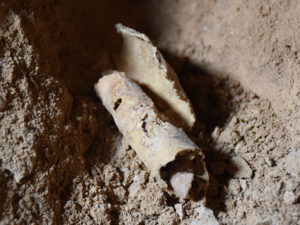
QUMRAN, Israel – For the first time in over 60 years, researchers have discovered a cave near the Dead Sea that once housed ancient scrolls, renewing archaeologists’ hopes that additional Dead Sea Scrolls may be waiting to be found.
Seventy years ago, Bedouin shepherds famously discovered ancient scrolls within caves near the Dead Sea. Widely recognized as one of history’s most important archaeological finds, the hundreds of Dead Sea Scrolls found within the caves near Qumran gave scholars an unprecedented collection of ancient biblical texts—some of which were 1,000 years older than any other such manuscripts in existence.
Until last week, most scholars believed that all the caves associated with the Dead Sea Scrolls had been identified and explored. However, in a surprising turn of events, the Hebrew University of Jerusalem announced on Wednesday that archaeologists discovered evidence of additional Dead Sea Scrolls in a cave on the cliffs near Qumran.
“Until now, it was believed that only 11 caves had contained scrolls,” a statement from the university said. “With the discovery of this cave, scholars have now suggested that it would be numbered as Cave 12.”
Described as a “surprising discovery” that represents “a milestone in Dead Sea Scroll research,” the excavation of Cave 12 revealed that it once contained Dead Sea Scrolls, but that the scrolls were looted by Bedouins in the mid-1950s.
“Numerous storage jars and lids from the Second Temple period were found hidden in niches along the walls of the cave and deep inside a long tunnel at its rear,” the statement said. “The jars were all broken and their contents removed, and the discovery towards the end of the excavation of a pair of iron pickaxe heads from the 1950s (stored within the tunnel for later use) proves the cave was looted.”
In addition to the storage jars, which once held the scrolls, archeologists found ancient pottery, arrowheads, flint blades, and a decorated stamp seal within the cave. Fragments of scroll wrappings, a string that tied the scrolls, and a leather scroll fragment were also collected.
“This exciting excavation is the closest we’ve come to discovering new Dead Sea scrolls in 60 years,” said archaeologist Oren Gutfeld, director of the excavation. “Until now, it was accepted that Dead Sea scrolls were found only in 11 caves at Qumran, but now there is no doubt that this is the 12th cave.”
The evidence clearly suggests that the cave was looted decades ago.
“I imagine [the Bedouins] came into the tunnel, they found the scroll jars, they took the scrolls,” Gutfeld told the BBC. “They even opened the scrolls and left everything around, the textiles, the pottery.”
Scholars believe that other important finds are likely hidden in the area.
“The important discovery of another scroll cave attests to the fact that a lot of work remains to be done in the Judean Desert and finds of huge importance are still waiting to be discovered,” said Israel Hasson, Director-General of the Israel Antiquities Authority. “We are in a race against time as antiquities thieves steal heritage assets worldwide for financial gain.”
Could additional scrolls be hidden in the caves along the Dead Sea? Given this recent discovery and the sheer number of caves in the area, experts are hopeful about their chances.
“This is only the beginning of our search for more scrolls,” said Dr. Randall Price, a research professor at Liberty University who was part of the team that discovered the relics inside Cave 12. “Undoubtedly, they are out there, and we know of some 300 caves in the area. Our team is planning to return to excavate other caves in the near future.”
“Now that we were successful, it means there are new opportunities for us to get in there and continue to study these caves,” he added. “The goal is to find scrolls.”
Become a Christian News Network Supporter...


